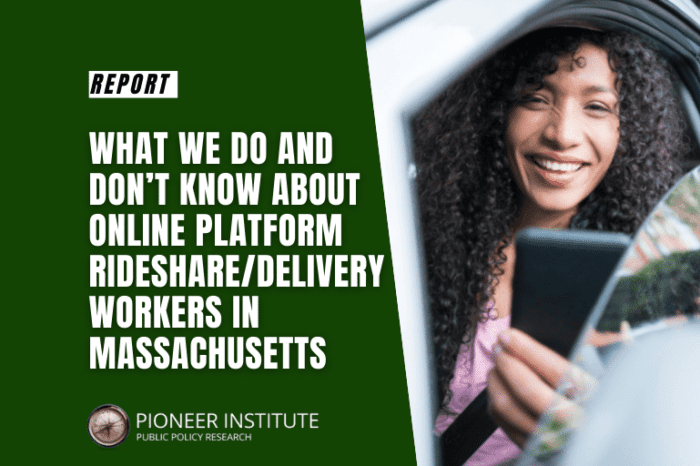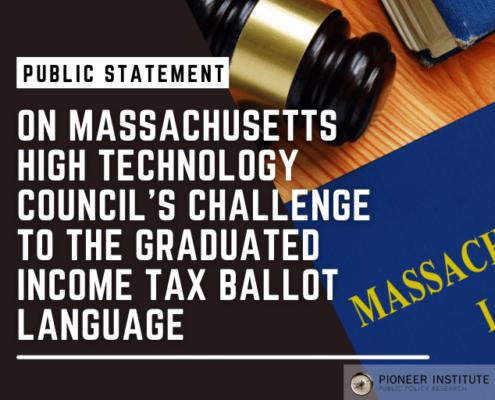Study: Legislators Must Answer Key Questions Before Setting Policy for App-Based Rideshare/Delivery Workers
Big Data industries require data-driven policymaking
BOSTON – After Massachusetts’ Supreme Judicial Court declared an initiative that was to appear on the November ballot unconstitutional, the issue of how to classify app-based rideshare/delivery workers is back in the hands of the state Legislature. A new study published by Pioneer Institute distills from the research literature eight questions legislators must answer before determining how to address this fast-growing industry.
“It may be surprising to many, but policy makers lack the most basic information about the gig workforce,” said Tom Ahn, author of “What We Do and Don’t Know about Online Platform Rideshare/Delivery Workers in Massachusetts.” “It is not an exaggeration to say that they don’t know who or how big the gig workforce is, and they don’t know its motivations.”
The issues surrounding reclassification are well known. App firms would be required to provide employee benefits, pay increased taxes, and standardize or guarantee a minimum wage. They may have to take a more active role in maintenance and monitoring of vehicles, provide or subsidize access to insurance, and be required to set and manage shift schedules for drivers.
The app firms argue that reclassification would adversely impact their businesses, increasing financial, administrative, and legal overhead. They fear it would lead to the exodus of its workforce, which they see as having heterogeneous preferences, with many workers placing a high value on work schedule flexibility. Reduced flexibility could force out workers unable or unwilling to adhere to a fixed schedule, and the prospect of a predictable income and schedule may make the job more attractive to others.
The report urges legislators to answer eight basic questions, summarized below, before beginning to deliberate on legislation related to the app-based rideshare and delivery industry. Most fundamentally, we must understand who is engaged in gig work and why.
Currently available data does not allow us to understand or provide a definitive description of the workforce. Firm surveys of workers often fail to collect basic socio-demographic characteristics, and the large amount of worker churn makes data accurate today less relevant tomorrow.
Policymakers do not know the size of the online platform rideshare/delivery workforce. The gig workforce is experiencing fast growth, such that almost 10 percent of the working population has engaged in some online gig work in the past, but research findings on the current size of the workforce range tremendously, from 1 to 15 percent of the labor force.
There is substantial evidence that people choose gig work as a supplementary source of financial stability. Worker surveys show that a majority of gig workers feel that firms have been fair with respect to pay and assignments, see themselves as independent contractors rather than employees, and rate their job experience favorably.
But there is no consensus on how much drivers earn. Because so much of the compensation depends on drivers’ own choices as well as the pricing set by the apps, researchers can arrive at very different numbers.
Finally, there have been few credible studies of gig workers in Massachusetts, seeking to understand whether there are differences between the workforce here and elsewhere.
“On issues where there are widely differing policy perspectives, it is best to start with the data—and that’s especially true with Big Data innovations, which disrupt the status quo,” said Jim Stergios, Pioneer Institute’s executive director. “Starting from good data, the legislature needs to develop smart policies to ensure and expand economic opportunity for the workforce.”
About the Author
Tom Ahn is an Assistant Professor in the Department of Defense Management at the Naval Postgraduate School (NPS). After serving in the South Korean army for three-years, he completed a two-year post-doctorate position at Duke University. He taught at the University of Kentucky for seven-years and has been at NPS since 2017. Ahn has published in Journal of Econometrics, Journal of Business and Economic Statistics, and Journal of Urban Economics.
About Pioneer
Pioneer Institute develops and communicates dynamic ideas that advance prosperity and a vibrant civic life in Massachusetts and beyond. Success for Pioneer is when the citizens of our state and nation prosper and our society thrives because we enjoy world-class options in education, healthcare, transportation and economic opportunity, and when our government is limited, accountable and transparent. Pioneer believes that America is at its best when our citizenry is well-educated, committed to liberty, personal responsibility, and free enterprise, and both willing and able to test their beliefs based on facts and the free exchange of ideas.











